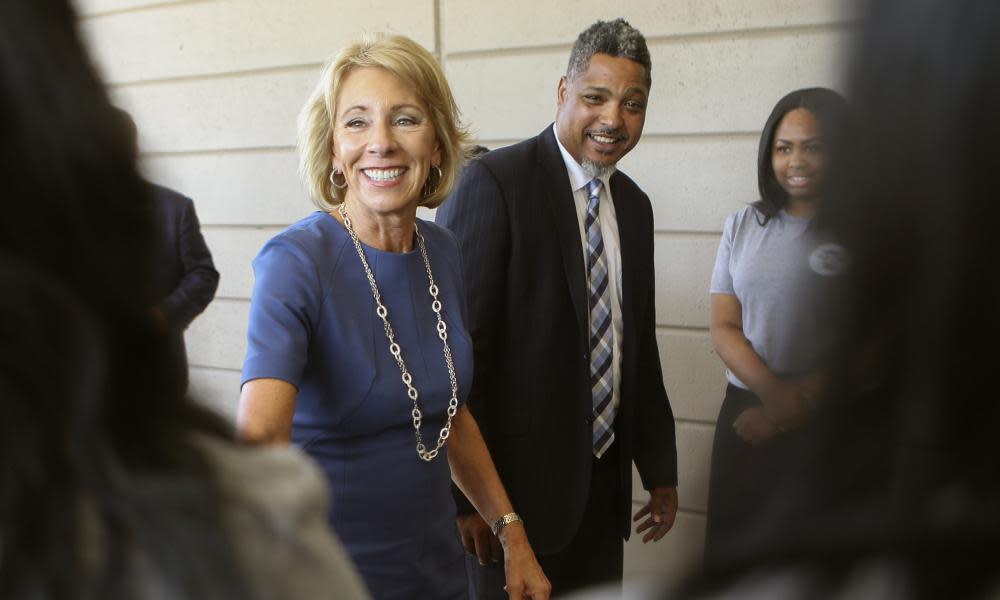Betsy DeVos scraps Obama rules on investigating campus sexual assault

The Trump administration on Friday scrapped Obama-era guidance on investigating campus sexual assault, replacing it with new interim instructions allowing universities to decide which standard of evidence to use when handling complaints.
The education secretary, Betsy DeVos, has said the Obama rules were unfairly skewed against the students accused of assault. Her new temporary guidance allows colleges the freedom to decide which standards of evidence they want to use when investigating complaints of sexual assault.
Advocates for student survivors of sexual assault quickly condemned the news, with some saying DeVos lacked the legal ability to change the standard of evidence – one of the most controversial elements of the debate surrounding campus sexual assault.
In her statement, DeVos said: “This interim guidance will help schools as they work to combat sexual misconduct and will treat all students fairly … schools must continue to confront these horrific crimes and behaviors head-on. There will be no more sweeping them under the rug. But the process also must be fair and impartial, giving everyone more confidence in its outcomes,” she said.
Under Obama’s instructions from 2011 and 2014, colleges were notified the department expected them to use “the preponderance of the evidence” standards, while DeVos lets colleges choose between that standard and “the clear and convincing evidence standard”, which is harder to meet.
The temporary guidance will be in place while the education department gathers comments and comes up with new rules.
The Obama guidance did not create the “preponderance of evidence” standard, advocates argued, but merely put schools on notice that they were required to use this standard under longstanding federal law.
“[It] is simply unlawful to flip a civil right on its head,” said SurvJustice, a nonprofit that provides legal assistance for students bringing claims of sexual assault. “The department has exceeded its authority to intentionally place protections for those accused of sex discrimination over those victimized by sex discrimination … It has no legal authority to advance rights for only accused students.”
But the change is sure to be welcomed by the scores of advocates who feel the current policies are unfair to students who stand accused of sexual assault.
DeVos has faced consistent pressure since taking office from congressional Republicans, students who say they were railroaded by false accusations, and groups of legal scholars to backpedal the Obama administration’s approach to enforcing title IX, the federal law that prohibits gender discrimination in schools.
Just a few weeks ago, DeVos appeared to be taking a more gradual approach to reform.
In a 7 September speech at George Mason University’s law school, she said her department would issue a new guidance for schools handling sexual assaults, but in the speech she stopped short of saying this would rescind Obama’s guidance.
At the time, advocates who had been fearful DeVos would withdraw the guidance said doing so would not change the rights of students who have been assaulted or schools’ obligations to investigate their complaints. Those are based on federal courts’ interpretation of title IX.
But they cautioned that rescinding the guidance could leave schools confused about their obligations.
“The department has to be really careful here, because they run the risk of confusing schools and leading them down the wrong path,” Fatima Goss Graves, president of the National Women’s Law Center, told the Guardian.
While the Obama administration’s guidance unleashed seismic changes in the way colleges and universities handled accusations of sexual assault, it did so largely without creating new policies or requirements. What distinguished the previous administration’s approach was the fanfare surrounding its release and the Obama administration’s stepped-up enforcement.

 Yahoo News
Yahoo News 
